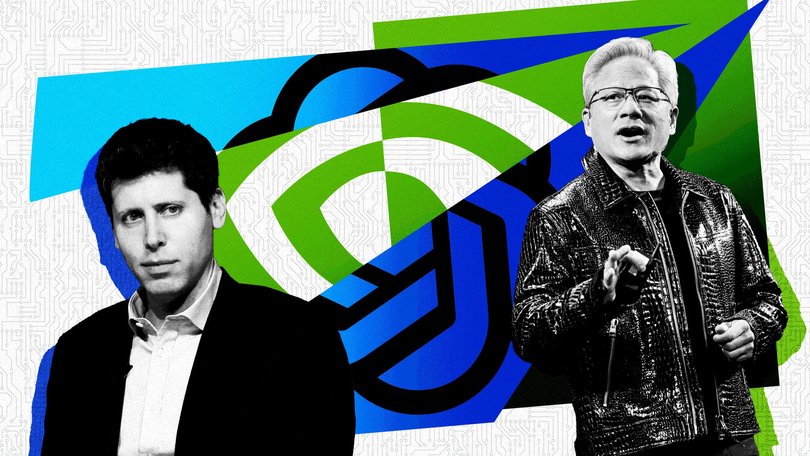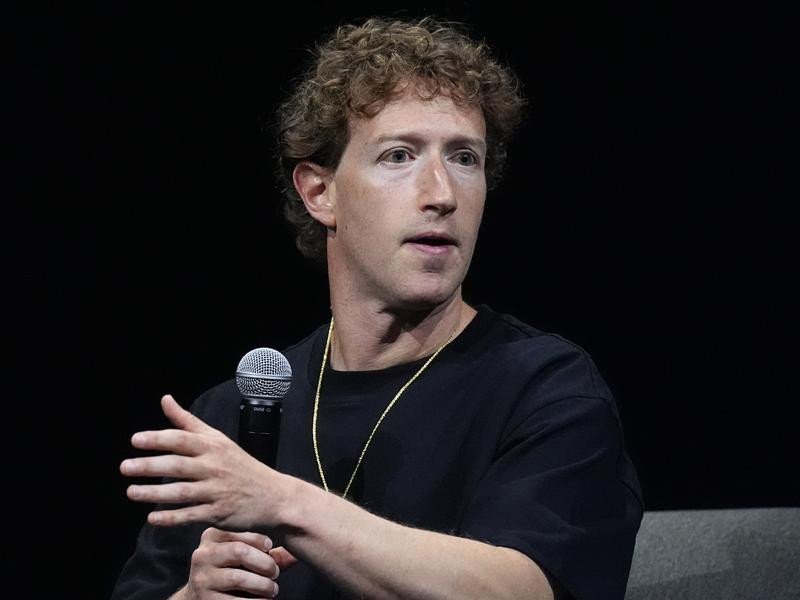TOM RICHARDSON: AI is killing capitalism as mega-cap tech uses power and profit to entrench economic supremacy
TOM RICHARDSON: Sam Altman says AI will change the world in unknown ways, but governments may have already lost the race against their big tech masters.

The race among mega-cap tech players to dominate the artificial intelligence sector heated up again on Tuesday, after computer-chip giant Nvidia announced plans to invest $US100 billion ($1.5b) into ChatGPT-owner OpenAI.
Shares in the world’s largest company, Nvidia, jumped 4 per cent on the news, as OpenAI’s founder and AI apostle Sam Altman touted the technology’s potential to transform society within a decade as it eventually outsmarts humans.
“The stuff that will come out of this superbrain will be remarkable in a way I think we don’t really know how to think about yet,” Mr Altman told CNBC.
Sign up to The Nightly's newsletters.
Get the first look at the digital newspaper, curated daily stories and breaking headlines delivered to your inbox.
By continuing you agree to our Terms and Privacy Policy.Capitalism is dying
Mega-cap tech players including Google-owner Alphabet, Microsoft, Meta, and Amazon are expected to lead AI investments totalling around $US2 trillion in 2026, according to research house Gartner.
The investment rush is coming as mega-cap tech’s founders eye off AI’s ability to enhance their growing dominance of markets, workers, governments, courts, and society.

As an example, Meta has around 3.5 billion daily active users largely across its Instagram, Facebook and WhatsApp platforms. And AI is now accelerating its business model’s success. Meta’s engineers train the algorithms, and then the algorithms train the social media users back. AI enhances this feedback loop and grows time spent on Meta’s platforms by its 3.5 billion daily users that work for it, for free.
“AI is significantly improving our ability to show people content that they’re going to find interesting and useful,” Mark Zuckerberg told investors on Meta’s June quarter earnings call. “Advancements in our recommendation systems have improved quality so much that it has led to a 5 per cent increase in time spent on Facebook and 6 per cent on Instagram just this quarter.”
While Alphabet-owner Google now has nine products including Gmail, YouTube, Maps and Search that boast more than 1 billion users.
Both companies posted blockbuster profit growth in the June quarter as their users help them grow profits at no expense to the owners of the equity in the businesses.
Economists attack tech
Greek-born, British-educated economist and politician Yanis Varoufakis argues Google and Meta should be seen as internet landlords earning a rent in a feudal system of land owner and slave, rather than as businesses making a profit as a capitalist concept.
This is because their social media users are not the product, but the tenants or slaves of the internet landlords paying them a rent.
According to Mr Varoufakis, the lack of regulatory pushback against mega-cap tech’s internet monopolies means we’re now exiting the capitalist age of human society into an age of online feudalism.
This argument fits into the narrative of $2 trillion being spent on AI in 2026 as mega-cap tech bosses see the technology as an existential race to entrench their dominance as landlords further.

“Little by little, capitalism’s two great pillars — profit and markets — are being replaced,” Mr Varoufakis says in his book on What Killed Capitalism. “The world economy is being lubricated less and less with profit and increasingly with cloud rent.”
Food delivery app Uber Eats is another example of how internet landlords are replacing the capitalist system of competition and free markets, with a feudal system of dominance to earn rents.
Today, Uber Eats as a landlord can control whether or not small restaurants in Melbourne or Sydney can reach their own customers in what Mr Varoufakis labels technofeudalism.
Elsewhere, Google-owner Alphabet is arguably the ultimate rent-charging internet landlord and behemoth. Over the last 12 months its shift of search engine results to AI has lowered internet traffic to local news sites some 50 to 80 per cent. Meta also has the power to turn on or off its subordinate news sites’ access to many of their readers.
Mr Varoufakis says this status quo means the owners of mega-cap tech businesses are the new ruling class more powerful than politicians that are often up to their necks in mega-cap equity ownership themselves in the US.
Yesterday, it was also reported that the powerful Murdoch family is also interested in co-funding a bid for TikTok in the US, as it spies an opportunity to join the internet landlords.
“How revolutionary that new ruling class [mega-cap tech] would prove, leveraging its cloud capital to make almost the whole of humanity work for them, either for free or for a pittance - including many capitalists,” Mr Varoufakis writes. “And crucially what a backward step that would prove in emancipating all of humanity and the planet from exploitation.”
Regulatory woes
The courts in the US as the other separate arbiter of power have also failed to move against mega-cap tech, despite numerous cases brought by the Department of Justice as the country’s anti-monopoly enforcer.
On the contrary, Alphabet shares have soared nearly 20 per cent, or $US600 billion in value, to a record high since September 2 when a US judge declined to take much serious enforcement action against the internet giant, despite an August 5 court ruling it broke US law as “a monopolist” .
Outside the US, the obvious problem is that national governments have little ability to rein in mega-cap tech on their own. Only, Mr Varoufakis’ natural home of the political left in the Europe Union has regularly legislated against mega-cap tech’s growing power and seeks financial penalties.

Another prominent economist in Macquarie Group’s Viktor Shvets has also warned AI may lead to mass redundancies and the need for a universal basic income for vast swathes of society out of work.
In his book, The Twilight Before The Storm, How to Avoid a World on Fire, Mr Shvets argues new AI-driven technologies will widen the wealth gap between owners of stocks and property, versus workers reliant on wages to cover weekly expenses.
Moreover, he adds the world is heading to an unclear alternative system of governance somewhere between capitalism, feudalism, despotism, or communism.
“It is not just about ChatGPT and AI, but the supercluster of innovation that is accelerating at a speed which neither the regulators nor societies can match,” Mr Shvets writes. “The best way to look at AI is as the highly disruptive general-purpose technology that is reaching escape velocity and starting to propagate across numerous other applications.
“In the process it disintermediates labour. Over the next decade at least 60 per cent of the global labour force will likely lose at a least a minimum of 30 to 50 per cent of their functionality.”
The dark warnings have not put off investors from betting on the the Magnificent 7 tech stocks as the big winners from AI, with Alphabet soaring 56 per cent, Meta adding 36 per cent, and Microsoft gaining 19 per cent over the last 12 months.
The share price moves mean the Magnificent 7 as the internet’s feudal landlords now make up 35 per cent of the total market value of the S&P 500 Index and a far greater concentration of power over society.

